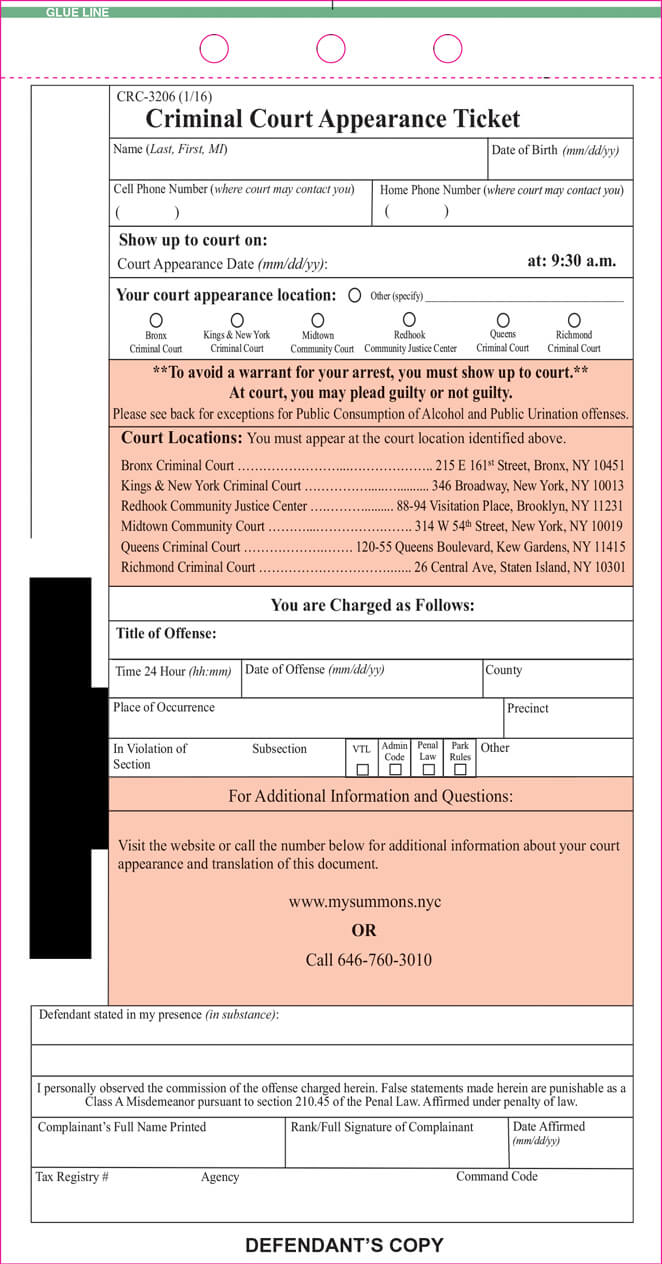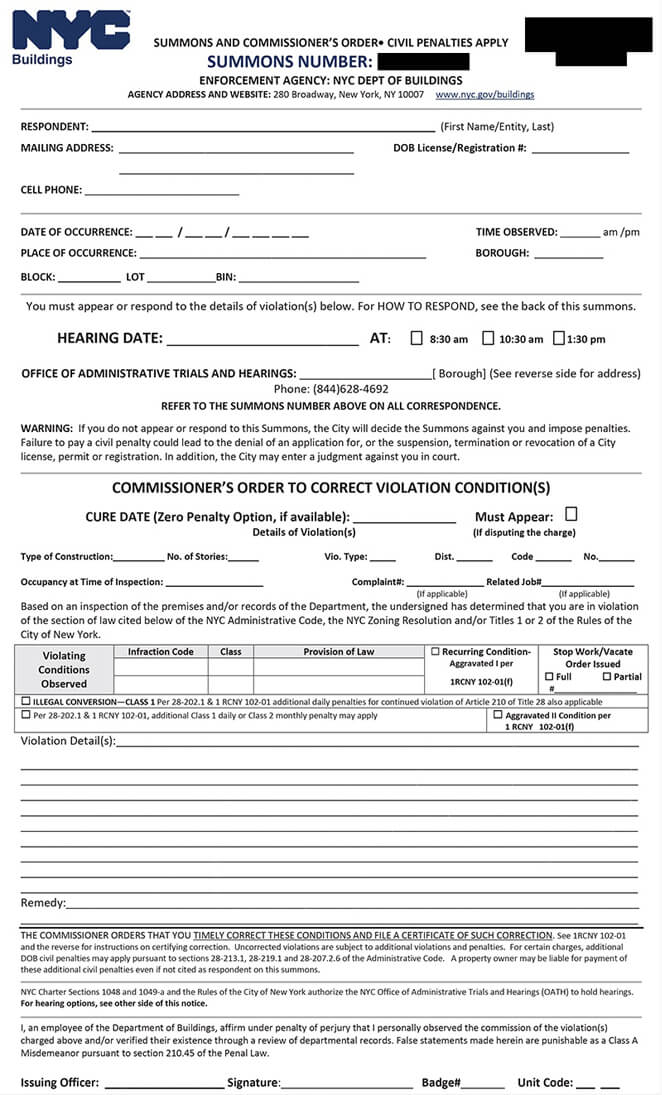Criminal Violation FAQs
Yes. If you receive a criminal summons for an alleged FDNY or DOB violation you must appear in court on the date listed on the summons. In New York, a corporate entity that receives a criminal summons must be represented by legal counsel. If you fail to appear and respond to a summons, a Judge will enter a default judgment against you. If the named defendant is an individual, a Judge may issue a bench warrant for the individual’s arrest.
Many state and local agencies can issue criminal summonses including, but not limited to, the NYPD, FDNY, DOB, and DEC. While many of these agencies often seek civil penalties in front of the Environmental Control Board, serious offenses are often prosecuted in criminal court. In some instances a criminal summons may be preceded by an administrative violation order and/or one or more ECB proceedings. If timely corrective action is not taken to address an offensive condition, a criminal summons may then be issued.
Not necessarily. Proceedings in criminal court and proceedings brought before the Environmental Control Board are parallel enforcement measures and the outcome of one proceeding does not necessarily have any bearing on the outcome of the other. Substantive and procedural differences between New York State’s criminal law and the Rules of the City of New York can often result in different outcomes.
You have every right to fight your summons, put the state to its burden of proof, and retain an experienced attorney to zealously defend you. While we always review the unique facts of every case to determine whether it’s possible to contest a summons on procedural and/or substantive grounds, it’s important to remember that lengthy litigation is often more costly than accepting a reasonable settlement offer. We always ensure our clients understand the relative cost of litigating a case to conclusion versus accepting an anticipated settlement offer so they can make an informed decision and choose a course of action that best serves their interests. Our legal strategy is always responsive to, and informed by, this critical decision.
Every charged offense correlates to a specific range of potential fines and penalties. While we can’t provide an accurate answer without reviewing the specific facts unique to your case, many of the cases we handle involve regulatory offenses relating to building and fire code violations that can potentially result in a misdemeanor conviction, imprisonment, and thousands of dollars in fines. While a corporate defendant can't be imprisoned, negative consequences such as hefty fines and a corporate criminal record still warrant serious consideration.
This situation usually arises when a corporate client hasn’t updated their records with the Secretary of State to include an up-to-date address where service of process can be forwarded. Unlike serving an individual defendant, pursuant to New York’s criminal procedure and business corporation laws a domestic or authorized foreign corporation can be served by delivering a summons to the Secretary of State in Albany, who will then forward the summons to the corporation. If the address on file for the corporation is no longer accurate, a corporate defendant may not receive timely notice and will first learn about a pending criminal action when a notice of default is received from criminal court.
If you fail to appear for your arraignment, a default judgment will be entered against you. Unfortunately, many corporate defendants don’t appreciate the full impact of a default judgment until it’s too late, interest has accrued, and the matter has been referred to a City Marshal who will seek to enforce the judgment by seizing corporate assets. Needless to say, frozen bank accounts can wreak havoc on the daily operations of any business. Moreover, a default judgment will show up on title searches and can therefore impact efforts to sell or refinance a property. If the named defendant on the summons is an individual rather than a corporate entity, a bench warrant will be issued for the individual’s arrest which can turn something as common as a routine traffic stop or re-entry to the United States into a regrettable affair. Luckily, an attorney can often take steps to rectify this situation but the process often becomes increasingly lengthy and involved as more time passes.
If you received a Notice of Execution from a City Marshal seeking to collect a money judgment, it's important to act quickly to avoid further enforcement measures which may include the seizure of corporate assets to satisfy the judgment. Under some circumstances, it may be possible to delay the Marshal's collection efforts while the underlying case is restored to the appropriate court's calendar, the judgment is vacated, and a resolution is negotiated so that a reduced amount of money is owed. An attorney will need to review the facts unique to your case to determine whether such a remedy is available.
This situation is not uncommon and under some circumstances it may be possible to restore the underlying case to the appropriate court's calendar, vacate the old judgment, and negotiate a resolution so that a reduced amount of money is owed and any accrued interest is waived. A Satisfaction of Judgment can then be filed with the appropriate clerk's office to clear the affected title. An attorney will need to review the facts unique to your case to determine whether such a remedy is available.
Environmental Control Board FAQs
Maybe. If you receive a Notice of Violation (“NOV”) you always need to do something, but unlike responding to a criminal summons, you may not need to appear for an in-person hearing. Notices of Violation are adjudicated by the Environmental Control Board (“ECB”), a division of NYC’s Office of Administrative Trials and Hearings (“OATH”), with hearing locations in all 5 boroughs. Depending on which agency issued the NOV and the type of violation alleged, there may be ways to avoid an in-person hearing. For example, you may be able to avoid an in-person hearing by mailing a timely certificate of correction, admitting to the violation and paying a fine by mail, or arranging to participate in a hearing remotely. Of course, if you retain an attorney or authorized representative to appear on your behalf, you won’t need to attend a hearing unless your testimony is necessary to defend your case.
No. You can represent yourself at ECB, and in fact there may be circumstances under which hiring an attorney would not be necessary or cost effective. However, keep in mind that many of the agencies that issue NOV’s such as the FDNY, DOB, DEP, and DOHMH are typically represented by attorneys or highly trained representatives. Making sure that you are also represented will help ensure that you receive a fair hearing. Moreover, an attorney with experience handling ECB cases will be uniquely aware of recent developments and nuances in the law which may have a substantial impact on the outcome of your case. For these reasons you may be at a critical disadvantage if you are not represented. As a practical matter, it’s not unusual for the entire process at ECB to take many hours from the time you sign in until the hearing is concluded. For some, hiring an attorney is worth every penny, if only to avoid spending a full day in court.
If you miss your hearing a default judgment will be entered against you. Default judgments often impose fines which are even greater than those that would have been imposed if you appeared at a hearing and findings were made against you. Generally, a default judgment can be vacated if a request to do so is made within 60 days of the date the judgment is entered. After 60 days, it may still be possible to vacate the default judgment if a “reasonable excuse” for your failure to appear is offered along with supporting documentation. However, after 1 year passes a default judgment will only be vacated under “exceptional circumstances and in order to avoid injustice”. For this reason, it is in your best interest to address default judgments without delay.
For more information, contact The Eberight Law Group, P.C. today for a free consultation.
Disclaimer - The materials available on this web site are for informational purposes only and not for the purpose of providing legal advice. You should contact your attorney to obtain advice with respect to any particular issue or problem. Use of and access to this web site or any of the e-mail links contained within the site do not create an attorney-client relationship between The Eberight Law Group, P.C. and the user or browser.
Helpful Links

Criminal Court Appearance Ticket

Notice of Violation
